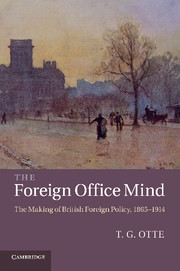Book contents
- Frontmatter
- Contents
- Illustrations (to be found between pages 146 and 147)
- Preface and acknowledgements
- List of abbreviations
- Introduction
- 1 Illusions of supremacy
- 2 The problems of isolation
- 3 Problems of consolidation
- 4 Two Eastern Questions
- 5 The transformation of Great Power politics
- 6 The end of an era
- Conclusion
- Select bibliography
- Index
- Plate section
- References
5 - The transformation of Great Power politics
the Edwardian ‘Foreign Office mind’, 1900–1907
Published online by Cambridge University Press: 07 October 2011
- Frontmatter
- Contents
- Illustrations (to be found between pages 146 and 147)
- Preface and acknowledgements
- List of abbreviations
- Introduction
- 1 Illusions of supremacy
- 2 The problems of isolation
- 3 Problems of consolidation
- 4 Two Eastern Questions
- 5 The transformation of Great Power politics
- 6 The end of an era
- Conclusion
- Select bibliography
- Index
- Plate section
- References
Summary
The period between 1900 and 1907 began with attempts to consolidate Britain’s now more precarious position in a more volatile international environment; it ended with its transformation. This was not the intended outcome, but one largely facilitated by external developments, primarily the weakening of Russian power after 1905 and the emergence of a more restless Germany. It was against this backdrop of greater international competition that a new generation of diplomats began to fill senior positions at the Foreign Office and in the diplomatic service. The formative, generational experiences of the later-Victorians and Edwardians differed from those of the high-Victorians. They chafed at the perceived inadequacy of the latter’s ‘laissez-faire’ diplomatic methods. In this respect, their disquiet was fuelled by the notion of ‘national efficiency’ that now dominated the domestic political discourse. It also provided the necessary intellectual and political stimulus for the introduction of the major organizational reform of the Foreign Office in 1905/6. This allowed the Edwardians to establish a firmer grip on the policy-making process. These internal rearrangements ran parallel to, and increasingly shaped, attempts to solve Britain’s international difficulties within the existing conceptual foreign policy framework of relative aloofness.
‘Rising through the upper crust’: the revolution in the diplomatic service
The overhaul of the existing machinery of diplomacy was to have a powerful impact on the framing of British foreign policy. As Sir Thomas Sanderson, then an AUS, had noted wryly in the early 1890s: ‘You cannot invent a machine into which documents can be put at one end and conclusions ground out at the other by turning a handle.’ Yet the people who operated the machinery and their place within the apparatus affected policy outcomes. Both the overall purpose and the functioning of the existing machinery, as well as the role of officials in formulating policies, were vigorously debated in the years after 1900. Sanderson himself had described the Office as ‘a slow and ponderous’ organization.
- Type
- Chapter
- Information
- The Foreign Office MindThe Making of British Foreign Policy, 1865–1914, pp. 240 - 313Publisher: Cambridge University PressPrint publication year: 2011



